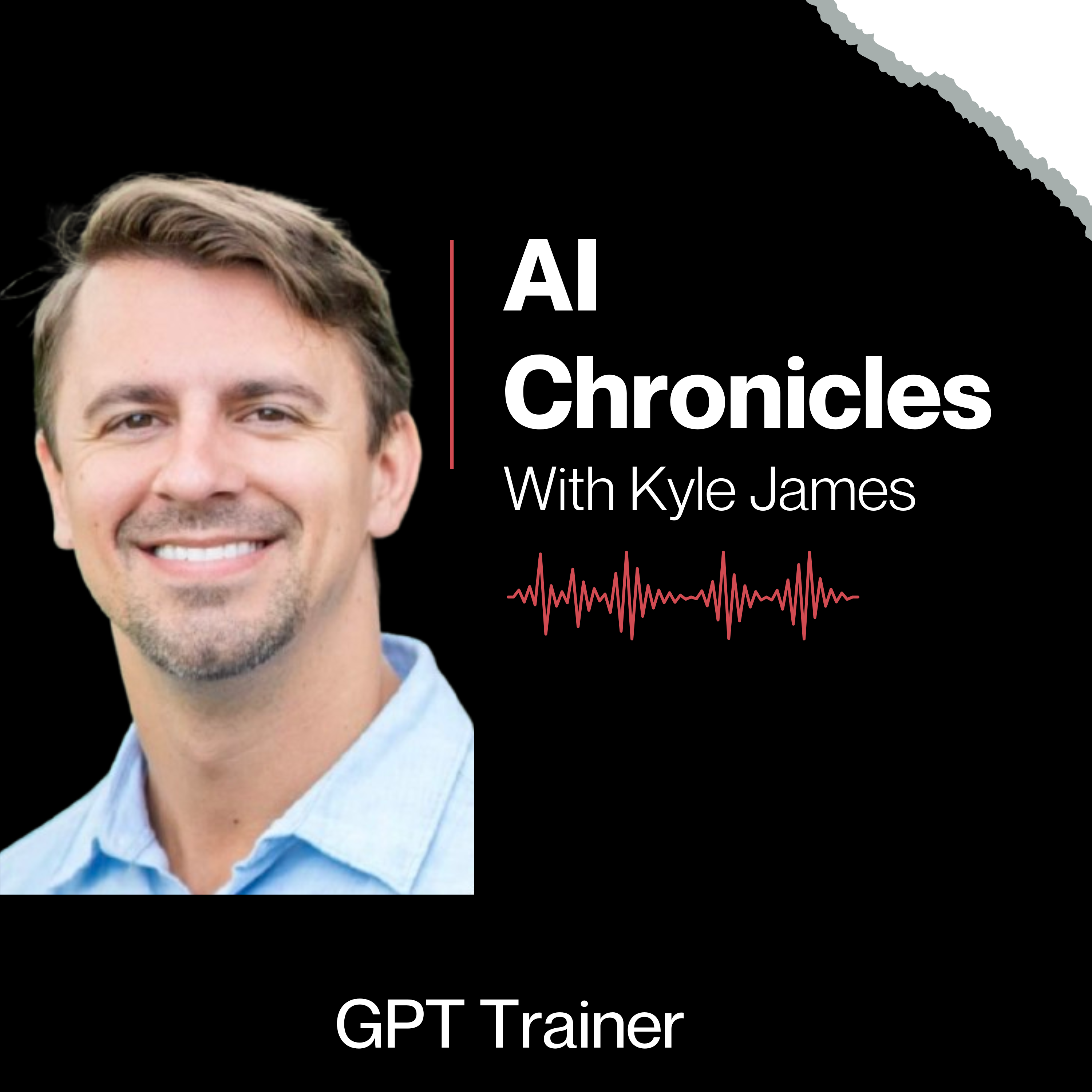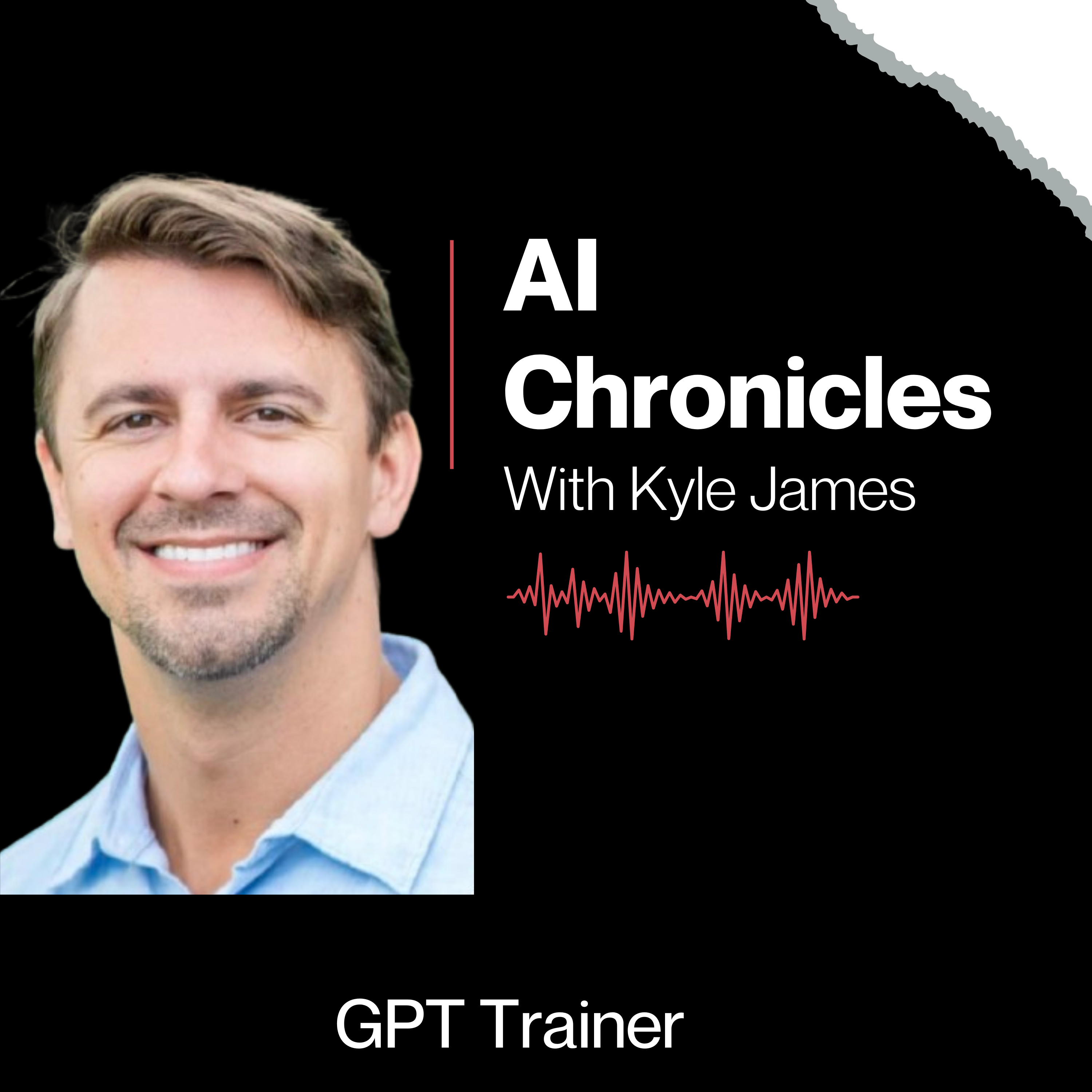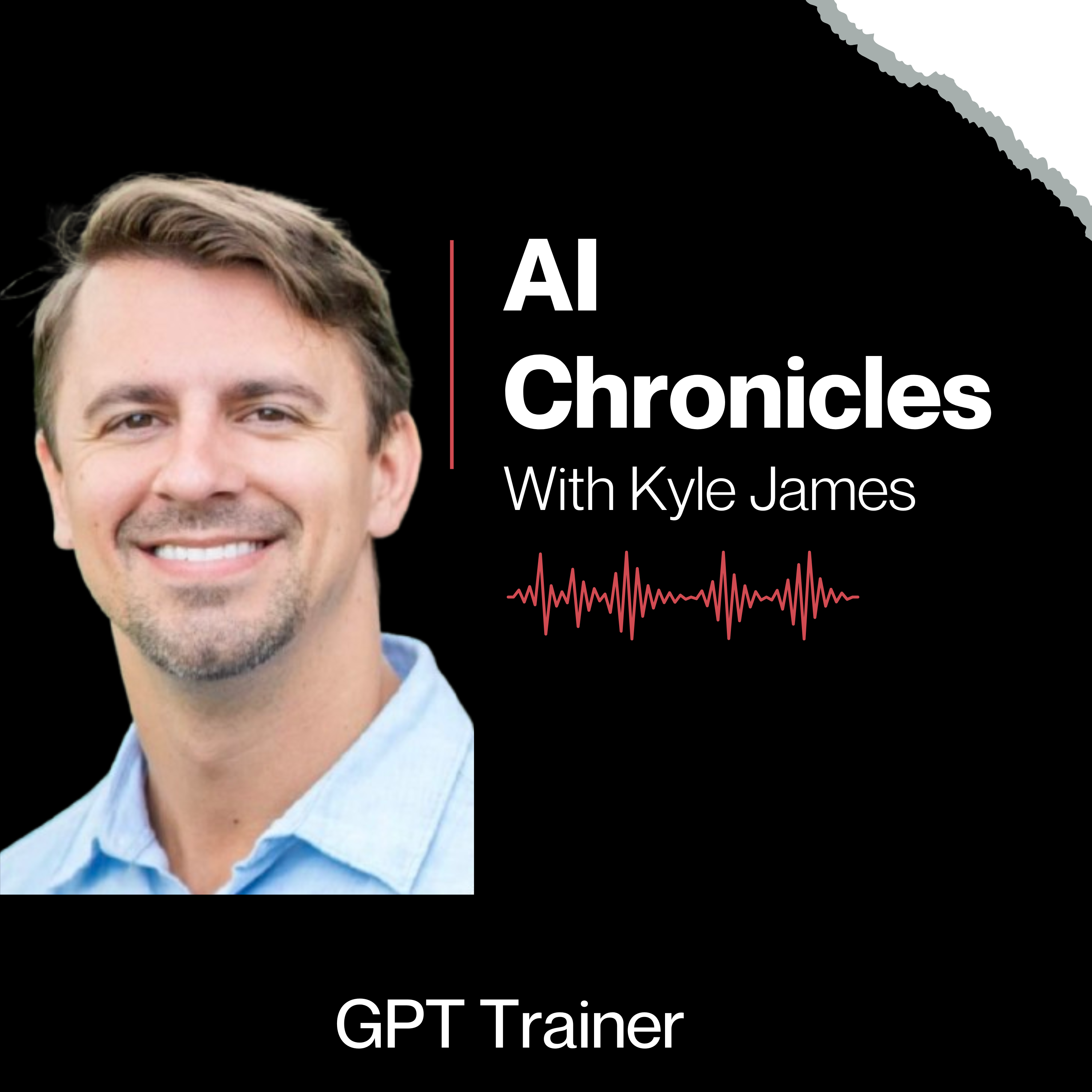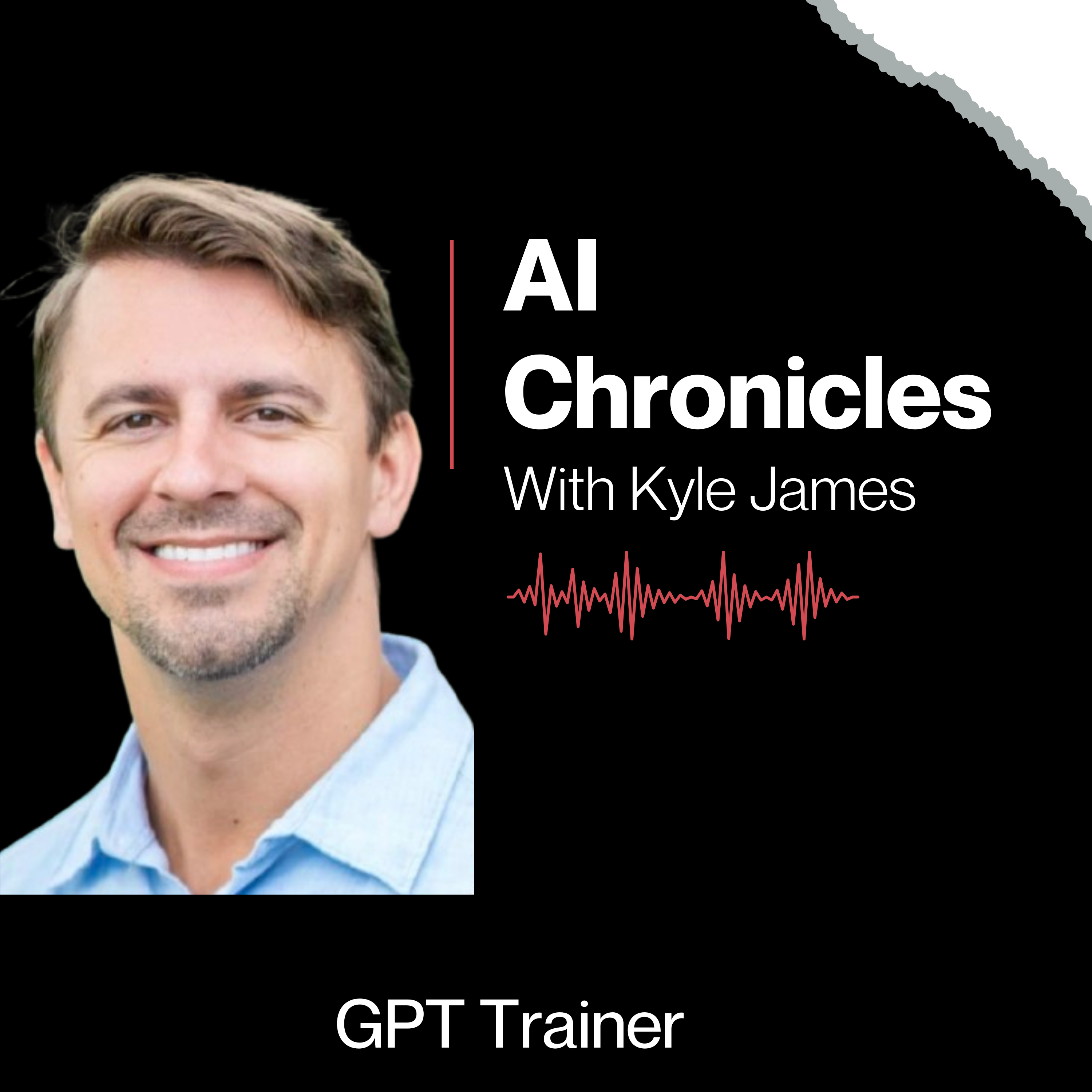Episode Transcript
Kyle James (00:01.154)
Hey, welcome to the AI Chronicles podcast. I'm your host, Kyle James. Today we're going be discussing how an AI powered information and technology company called Azoma is using AI inside of their own business to help companies get listed on popular AI search engines like ChatGBT, Google Gemini, Perplexity, and Amazon Rufus. And we'll share the exact steps that you can take in order to implement AI for yourself. Now, before I dive into that, listen closely.
Are you looking to implement AI inside of your own company or just struggling to get your AI to stop hallucinating? Speak to GPT Trainer. GPT Trainer literally builds out and manages your AI agent for you, eliminating hallucinations for good. Go to gpt-trainer.com. I promise you, it'll be the biggest time-saving decision that you've made all year. Trying to set up AI on your own is like trying to build a house from scratch. Sure, you could do it, but...
The time and frustration is going to take you to get it finished just isn't worth it. It's a thousand times faster and safer to hire professionals. Schedule a consultation today. Once again, that's gpt-trainer.com. Say hi with me, Max Sinclair, who is the founder and CEO of Azoma. Max is an ex-Amazonian as well as the host of New Frontier, the AI, e-commerce and entrepreneurship podcast.
So excited to have you on the show today, Max. How are you doing, my friend?
Max Sinclair (01:30.463)
Great to be here, thanks for having me, Kyle
Kyle James (01:33.238)
Yeah, really excited for this conversation today. think a lot of people are going to benefit from hearing your perspective and learning more about Azoma. So tell me though, give me some context here. How did Azoma come to be?
Max Sinclair (01:45.215)
Sure, so I met my co-founder in 2022. And for the AI enthusiasts, we met maybe a week after stable diffusion V1 launch. So this is in about September and GPT-3 was around, not chat GPT, but kind of like the early large language models, early diffusion models. And he's a PhD in postdoc and AI.
And he showed me this kind of image generation model. I was working at Amazon in search and I was like, okay, this is crazy. This is going to be the future. I quit my job. started working together. And then in November of that year in 2022, chat GPT itself launched. And as someone who had worked in search, I was convinced that that would be the future of how products and services would be discovered. So we.
kind of refocus of business from like the content generation we're doing for a few months on to content generation, but optimised for AI search, we believe this was going to be a huge wave. and yeah, it's been a, it's been a hell of a journey. We've been doing it almost three years now, working together, we've, I guess, got backing from eBay ventures and a couple other kind of top tier VCs.
Kyle James (02:49.656)
Mm-hmm.
Max Sinclair (03:08.019)
working with some household name customers to help them get mentioned by ChatGPT, Amazon Rufus, and all the perplexity in all these different AI engines.
Kyle James (03:18.966)
Yeah, absolutely. you have a little, I think you were at Amazon for a couple of years before that, like, and then then you decided to start a Zomut. Like, I love what you guys are doing. It's absolutely incredible. Like, how, why did you decide to take that brand? I mean, working from Amazon to jumping over to, you know, your own business, like that's a big jump. You know what mean? Like what made you decide to take that leap?
Max Sinclair (03:24.863)
Yep.
Max Sinclair (03:37.918)
Yeah.
Max Sinclair (03:41.407)
So I guess I'd been working at Amazon for six years. So I joined straight out of university at 21 and I had taken, I think three or four promotions and I kind of reached like, I felt the more senior I got in Amazon, the more I realized that.
was kind of irrelevant cog in the wheel. Like you kind of, you go up and up and up and you realize like the command chain is like never ending tower to Seattle. Right. And it's kind of, I, I was under the, I got, I got to the view where I just didn't want my manager's job. I was thinking like, she, you know, she is kind of, I mean, she was a senior person, you know, title and everything, right. Like a director, actually like, I didn't want the job. She, you know, I, I realized that
Kyle James (04:08.797)
Yeah, yeah.
Kyle James (04:20.462)
Hmm.
Max Sinclair (04:30.965)
No real decisions were taken in the UK. Everything was done in Seattle. to be honest, it was all about, we were just executing. And I kind of, I've always wanted to start my own company. I did my own business when I was like 16. I kind of like started my own like babysitting and dog walking agency. So I've always had this entrepreneurial streak and I had around that time for about a year or so, maybe more.
Kyle James (04:52.11)
That's cool.
Max Sinclair (05:00.565)
been experimenting with side hustles. So I would kind of like, you know, work, I wouldn't say even nine to five, it'd be like an eight to six job at Amazon probably like pretty intense. And then I would on the, you know, in a few hours on the weekend or in the evenings, I would then do a side hustle. And I kind of, when I saw the generative AI stuff, I was like, this is a, this is a transformational shift. was just very obvious to me as it is, I think to everyone now.
Kyle James (05:11.074)
Mm-hmm.
Max Sinclair (05:26.997)
I was just fortunate to see it early that this was going to be a fundamental technology shift, a bit like the internet, and that it wasn't going to work for me doing this side hustle thing. I needed to be all in, I quit my job and founded the company, and we've been building since then.
Kyle James (05:41.357)
Mm-hmm.
Kyle James (05:45.506)
That's incredible. So tell me a little bit, like, you know, for all our listeners, like, you know, we know SEO, like the search engine optimization, but the GEO, like, tell us a little bit about that. And like, how does it, how does it like getting listed on chat GBT? That's a, everyone's using that. Like everyone's searching for a lot of products and services. So what exactly does, does Azoma do exactly? Maybe walk us through that step by step.
Max Sinclair (05:52.957)
Yeah.
Max Sinclair (06:03.743)
Yeah.
Max Sinclair (06:07.509)
Yeah, so, so, so Camp Gemini put out a study in January. So the numbers are six months old at this point, but they put out a study saying that 58 % of people have replaced Google search with an AI engine when they're looking for products and services. So in my perspective, we kind of reached this point now in 2025 where, you know, AI search is a dominant one. I mean, this is even
larger depending on the demographic. I think for Gen Z, 93 % of them will be using at least two AI tools a week. So they'll be using a chat GPT and a perplexity and they will understand the nuances of why they're going to each one separately or, know, clause and perplexity or whatever, right? They'll be using at least two of these. So we're now seeing this absolute shift. the first thing to notice is that getting ranked on
Chat GPT is fundamentally different from getting ranked on Google. Why? And this is talking to someone who worked at Search at Amazon. What we would do is we would kind of stack rank keywords. So you would have a, I'm holding up like a liver kind of improvement gummy, right? So the keyword would be liver improvement for men in their 30s, whatever it would be, And Amazon or Google, whoever,
Kyle James (07:24.74)
Yeah, yeah
Kyle James (07:29.838)
Mm.
Max Sinclair (07:33.289)
would then go, okay, looking at all my signals, I've got price, I've got sales velocity, I've got reviews, I've got 20, 30 signals. What is the bet? Like how do I stack grant the products against each individual keyword, right? And that was kind of the, what we would now call deterministic AI, like the AI algorithm that would run. With a LLM, it's an entirely different thing. So what happens is a customer puts in a prompt. So I say, I'm looking for a liver.
know, gummy, whatever it is. That prompt is then broken down into numbers because these AI engines work on a token basis. And then it's compressed because this stuff is super expensive to run. So you get this like compression of numbers. It goes into the AI engine. And then the AI engine kind of matches, you know, the prompt with the data on the customer they have, you know, they have 20 years of sales data on you on Amazon.
Kyle James (08:02.064)
huh. Sure.
Max Sinclair (08:30.097)
or whatever it is, depending on the person and all of the kind of world knowledge that the AI has been trained on. these, these they're called large language models because they've been trained on an enormously large amount of data. So you get these tokens in numerical format come in plus the data on the customer. And then the AI will look at that with its world knowledge and spit out an answer. So the reason I break it down like that is to kind of explain like it's, it's a fundamentally different technology.
Kyle James (08:31.822)
Mm-hmm.
Max Sinclair (08:57.173)
is not about trying to hit long tail keywords and find that gap in the long tail keyword where maybe liver capsules for women has some opportunity because there's lower signals there because there's no good competitors. And therefore, you can use that keyword and you're to go to number one. These AI engines are a lot more intelligent. They have a lot more context.
Kyle James (08:57.208)
Hmm.
Kyle James (09:14.976)
Sure, right, right, right.
Max Sinclair (09:20.115)
And therefore, you need an entirely new solution in order to optimize for them. And that's why we wanted to launch the Zoma.
Kyle James (09:28.588)
Yeah, that's amazing. I feel like it's a market that's not really being tapped because I look at like, almost like when I go and do a Google search for certain products or services, I get like top 10 results first page. And then I go to use ChatDBT or, you know, another large language model. Like I'm almost like I'm getting different results. I'm like, man, for the people who are getting on this, this results inside these large language models, this is huge, especially when you mentioned the numbers 58%.
Max Sinclair (09:55.381)
Mm.
Kyle James (09:55.668)
And I would imagine like the next wave of generation that's coming through, like they're going to be using more and more on the AI side. And so if they're searching for products and services, like that's, that's like, that's where it's headed. Wouldn't you say.
Max Sinclair (10:02.122)
Yeah.
Max Sinclair (10:06.355)
If you're targeting a younger demographic, and by younger, I mean anyone under 45, and I'm generalizing because my dad is closer to 60 and he uses ChatGPT for everything. So you don't want to generalize, but it is a default now. I saw another stat, is 60 % of Google queries now have no click as an answer because they're just serving up AIO views and you're not going to, you're not exploring kind of the links anymore.
Kyle James (10:11.085)
Mm-hmm.
Kyle James (10:21.207)
Hmm.
Kyle James (10:33.944)
Mm-hmm.
Max Sinclair (10:34.345)
The world is absolutely changing and that's why we felt that we should exist and we should help customers, brands and retailers and also with non-e-commerce customers to optimize for this.
Kyle James (10:47.074)
Yeah, absolutely. So tell me like, you know, for the different clients you've been working with, like what types of results have you been seeing since you've been helping them, you know, implement this, this GEO, right? This, this, this type of search.
Max Sinclair (10:54.558)
Yum.
So it's very like, so the way that we do it is we will give customers a bunch of metrics. We will show them like, this is how your share of mentions are in AI search. This is your sentiment, blah, blah, blah. We do this by peeing the model hundreds of thousands of times on a daily basis. And we have a pattern which looks at how the AI engines are scraping the internet and the responses that they're getting back. And we...
we see based on the web traffic of the AI engines and the sponsors, we have a predictive model to understand how people are actually talking about these topics. So we start by giving people a bit of visibility into what is a black box. That's step number one. But then, so the customer can see in our dashboard, OK, using Azoma's generated content, have increased our share of mentions. We've improved our sentiment, blah, blah, blah.
But they can also track this in their Google Analytics. They can see that their share of, know, that their site visits from ChatGPT is kind of 7x-ing, 10x-ing, something like this. is normal. we, you can move this stuff pretty quickly, unlike traditional ICO, which could take months for stuff to kind of get listed. These AI engines are going off and they're querying the internet at every query, right? So like, you know, and they bias towards fresh content. you, you know, putting stuff out, obviously you...
you need to be careful with spam and blah, blah, blah. Then you can't overdo it, but if you're generating high quality, content, you're going to get listed, you're going to get picked up, and you're going to get recommended to more customers.
Kyle James (12:25.388)
Mm-hmm.
Kyle James (12:38.102)
Yeah, that's huge man because like that's what I've heard so much is like SEO. It's a long playing game where it can take a couple months, even up to a year to get, you just trying to get more traffic to the website. But in this case, going through, this is quicker. It's like, hey, we get it. We get it. We get the things changed over. Like you're going to start seeing people search your website or search your products or services a lot faster in this case. Yeah, it's amazing. And
Max Sinclair (12:49.693)
Yeah, this is not as long of a game. Yeah, this is short.
Max Sinclair (12:59.007)
Hmm.
Kyle James (13:06.414)
Talking a little, stepping into 2025 and obviously 2026, what are some of those maybe upcoming AI initiatives that Azoma has planned out? And then where do you see AI playing the biggest role in the operations next?
Max Sinclair (13:20.873)
What so I guess we see ourselves as an entrant workflow platform we don't see ourselves as like a point solution so when you look at traditional SEO tools Like some rush or whatever they kind of would just give you a You know, they give you a bunch of metrics and then you would kind of go away and like work on that as a human and you would need
some level of expertise that even know what to make of this stuff, because they're just giving you tons of information. We see ourselves, as I said, as a end-to-end workplace. We don't just take those insights. We generate content with that. We're talking product listings. We're talking recipes, blogs, whatever we can. And we're very much mostly focused on enterprise. So we'll work with the customer, we'll understand where we can integrate with them, and we'll generate content that they can legally.
Kyle James (13:54.381)
Mm-hmm.
Max Sinclair (14:17.557)
well, legally, like they can get through their internal legal team and internal PR team and et cetera, et cetera. And it will all be in their brand voice and brand style and brand colors. So that's how we see ourselves. And therefore, what's on our roadmap would be increasing the agentic modules that we do. So at the moment we're blogs, product listings, recipes, but we've got a...
Kyle James (14:22.946)
Mm-hmm.
Max Sinclair (14:45.619)
We're doing a pilot now in terms of Reddit, like commenting on Reddit forums and threads on behalf of customers, because we know this moves the needle. So that'd be one thing. And plenty of other kind of agentic modules as well. I guess we also are expanding in terms of the AI models we support. So as I said, kind of, do everything, but we have like an e-commerce.
background as myself and a real specialization here, like helping people to get to be featured in chat, cheap, cheap shopping and Amazon Rufus. Like we see ourselves as the absolute leader in that space. And yes, you know, there are competitors who are talking about GEO, but no one is like got that retail and e-commerce experience and, you know, like live case studies and customers we do.
Kyle James (15:31.566)
Mm.
Max Sinclair (15:36.879)
You know, we're working with likes of Zaposs and Locatan and Canadian Tire, like a bunch of really big retailers and brands. expanding those models, so Walmart have just launched Sparky. That's something we're working on now to kind of take our learnings from Rufus and apply them to Sparky. We think that's going to be massive. We think ultimately like all of these different e-retailers.
Kyle James (15:53.603)
Mm-hmm.
Max Sinclair (16:03.541)
are going to have LLMs. Basically, every website you go on will just be an LLM interface in my view. And you'll talk to Walmart, Sparky, or Target AI, or whatever AI it is, you'll be talking rather than searching because it's just a better experience. So we focus on that as well. So those would be the two things.
Kyle James (16:24.79)
Yeah, yeah, absolutely. I think it's a good approach. I mean, like, it's like every single rough Amazon roughest and then like Walmart Sparky, like that's I'm sure that each of these huge brands are going to start having their own like AI agentic flow that they have within those connected these large language models, you know, that's
Max Sinclair (16:40.285)
Yeah, there's lots of similarities, but there's also some differences. And there's differences in terms of like Walmart, for example, where approved on the App Store is quite laborious to get into to be like approved Walmart partner. And you you need to be in on the App Store in order to publish content. So there's like
Kyle James (16:44.963)
Mm-hmm.
Max Sinclair (17:00.885)
There's a lot of, you know, there are similarities, there's also differences, there's also different integrations and work that the team has to do in order to, you know, to be approved on the, like, there's only like, I'd say about 50 apps on the Walmart app. So like, you know, it took us a good like three to six months to get on there. like, so stuff like that is, you know, we have to work on.
Kyle James (17:21.772)
Yeah, absolutely. And as we wrap up here, Max, for people listening in, where do you recommend they go to learn more about you and maybe a little bit more about Azoma?
Max Sinclair (17:32.117)
Yeah, well, I'm very cringy. So I'm very active on LinkedIn. So you can you can find me as Max Sinclair. You can go to our website, which is a Zoma.ai A Z O M A.ai. And, and yeah, we have a podcast as well, as I mentioned the new frontier so you can you can listen to us on that as well.
Kyle James (17:34.99)
Nice.
Kyle James (17:50.798)
Cool. Awesome. Man, thanks so much Max for joining us today. It's great to have you on the show and hopefully looking forward to connecting. I don't know, maybe in the future we'll have another podcast, who knows? Things move so fast in the AI space, you know what mean? So, and remember if you're looking to implement AI into your business today, don't try and do it yourself. The time and stress that the AI could cause just isn't worth it. Schedule a call with GPT trainer and let them build out and manage your AI for you.
Max Sinclair (18:01.567)
Thank you, Kyle.
Appreciate it.
Kyle James (18:19.534)
Go to gpt-trainer.com to schedule your consultation. Signing off for now, have a wonderful rest of your day and looking forward to seeing you on the next episode of AI Chronicles.



